Question
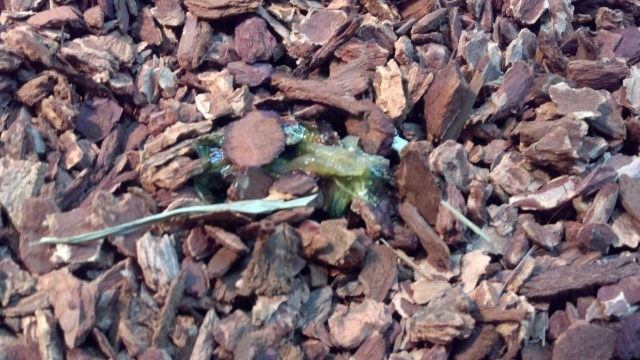 Tortoise vomit?
Tortoise vomit? 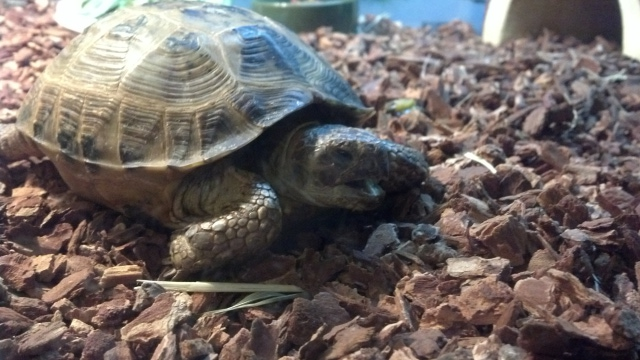 Dead tortoise
Dead tortoise
About a month ago my boyfriend and I purchased a juvenile Russian tortoise from Petco, and we named him Rex. Rex was approximately 5 inches long, and we kept him in a 40 gallon terrarium. We had Zoo Med Premium Repti Bark for his substrate, a large soaking/ drinking dish, and he ate a wide variety of leafy greens including kale, romaine lettuce, escarole, timothy hay, watercress and spring mix, in addition to TRex dry mix. He had a 30" Zilla UVB light that was on 12- 14 hours a day, and we also have a 100 watt basking bulb that was left on so his temperature was always around 85-90 under the bulb, but cooler (75-80 degrees) on the other side of the tank. We soaked him daily for 20 minutes at a time, allowing him to drink and get hydrated, and then we would change the water. When we first got him, we had issues with trying to get him to eat, but over the past week or two his appetite has increased significantly. Although he didn't eat much at first, he always had normal bowel movements, so we weren't too concerned. We were really just starting to see his personality and he finally seemed to have settled in to his new home. Tonight my boyfriend came home to find Rex dead. He was laying with his eyes half open and his mouth gaping. We have never seen him lay like this before, which is how my boyfriend knew something was wrong. When he picked up Rex he said that he was very stiff and that he didn't move at all, which is when he came to the conclusion that he had died. There was an odd looking light green/clear substance in the middle of the tank that had what looked like some partly digested leafy greens in it that we have never seen before and we are thinking that it is vomit. We honestly didn't even know that a tortoise could vomit, so we are wondering if it was possible that our tortoise started to choke, which lead to vomiting, which would explain why his mouth his gaping even though he has died? Is there anything that we did wrong that lead to our tortoises death?
AnswerHi April,
I'm very sorry that you lost Rex. There were some things you were doing incorrectly (not your fault, because unfortunately you probably received some poor care advice), but I doubt any of them led to poor Rex's death. Tortoises are really quite tough, and it would take more than a month of really bad care to kill one. So please don't feel that it was your fault! Let me just go over a few care things with you, though.
First of all, Rex was absolutely NOT a juvenile. I don't know why, and it's really maddening, but for some reason the chain stores tell buyers that the tortoises they sell are all young (usually 6 months to a year old)--I bet they told you Rex was captive bred, too. The tortoises are all mature or very close to it, and wild caught; at least five years old, and probably 10-15. A juvenile Russian tortoise is much smaller than Rex. The Russians sold at Petco are all roughly 4", so probably about 400-450g. A year old Russian weighs about 100g. Big difference.
Tortoises don't do well in tanks. They don't understand glass, and the glass itself makes it very difficult to establish a good temperature gradient unless the tank is very large (100+ gallons). A 40 gallon tank is really too small. My minimum for a Russian indoors is about 5 x 3, but I prefer to see an outdoor pen provided during the warmer months so the tortoise has a chance to graze and exercise in natural sunlight. Tortoises really will use all the room they can get, and you see more natural behavior when they have more room.
Your warm temperatures were fine, although the cool side temps were a little high (max should be 75 if possible). However, you didn't say where you were measuring, and this is important. Warm temperature should be measured on the substrate directly under the heat lamp. If you measure on the side of the enclosure, the substrate temp may be considerably higher (too hot).
The Repti-bark substrate isn't ideal, although not as bad as some (crushed walnut shells or straight sand are both potentially fatal substrates). The problem with it is that it doesn't hold humidity well, doesn't allow good burrowing, and the footing isn't great. A better substrate is a 50/50 mix of coir (bed-a-beast or ecoearth) and playsand. It should be kept a little damp to help avoid dehydration from the heat lamp. Dehydration is a serious issue with many pet tortoises.
The Zilla bulb is worthless in terms of UVB, unfortunately. I have friends who test different UVB bulbs regularly, and currently the only bulbs that provide decent UVB are the ZooMed Powersun (combo heat/UVB) and Reptisun 10.0 (UVB only). The Powersun needs to be replaced yearly, and the Reptisun every six months. You can read more here: http://russiantortoise.org/uvb.htm. The Zilla bulb isn't listed there, but at last report the UVB output was nearly 0.
Water should always be provided in the enclosure, in a shallow dish large enough for them to get into. Soaking should be limited to 2-3 times a week. Too much soaking can cause problems with food moving through the gut too quickly (they need to digest very slowly to extract maximum nutrition from food).
Russians are broad-leafed weed eaters, so leafy greens and weeds are the best diet for them. What you were feeding Rex is pretty good. They don't usually eat much, if any, hay. Other good greens are turnip, dandelion, collards, and mustard, plus weeds like chicory, chickweed, mallow, plantain, sow thistle, clover, hawkbit, etc. They love dandelion flowers, hibiscus, abutilon, as well as prickly pear cactus. Avoid fruit, veggies, and commercial foods.
Now, as to why Rex died--I'm afraid there isn't any way to know without a necropsy. However, I don't think the vomiting/expelling food was the cause of death. Sadly, the conditions under which Russians are imported into this country are pretty horrific. The reason the tortoises in Petco are so uniform in size is because that's the size where they can pack the most tortoises into a crate. They are crammed together and deprived of food, water, light, and fresh air, sometimes for weeks at a time, and many die during the importation process. Often the ones that do survive have parasite blooms or respiratory infections, and it's very likely that many of them have other health issues that aren't so obvious. I think it is very likely that Rex's death was ultimately due to the stress of the importation process, but you'll never really know exactly what the cause was. I'm sorry. :(
I hope that this sad experience doesn't put you off tortoises. They are endlessly fascinating and engaging pets if you are willing to make the effort to keep them properly. I don't recommend that people buy from pet stores, however, because of the terrible ordeal the tortoises undergo. I would either look for an adoption from a rescue, or buy a true captive bred hatchling from a private hobby breeder. A hatchling from a hobby breeder will cost you more, but it'll be healthy. If you decide that you want a hatchling, post back and set it to *private*, and I'll give you my email. I can put you in touch with someone who is reputable and has very healthy adults that produce healthy babies.
I hope I haven't overloaded you with information! Russian tortoises are my passion. :) If there is anything more I can help you with, please post back and ask!



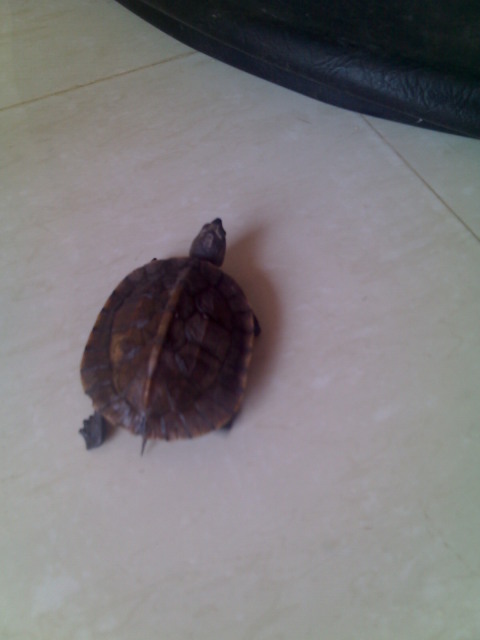 How do I care for an Indian Black Turtle (Melanochelys trijuga)
Question
Pic of the turtle
Hi,
I am am animal lover li
How do I care for an Indian Black Turtle (Melanochelys trijuga)
Question
Pic of the turtle
Hi,
I am am animal lover li
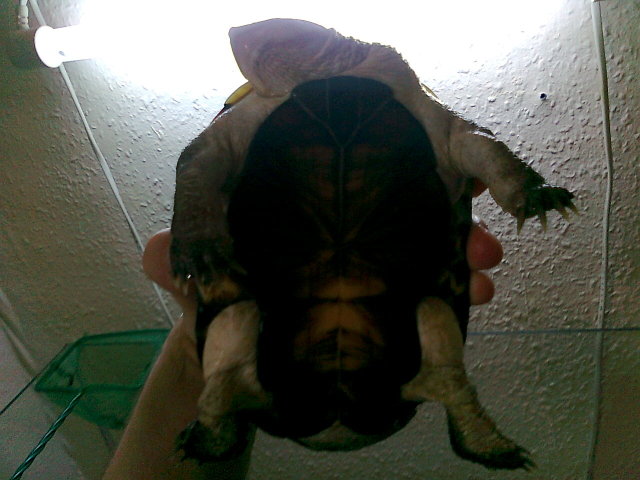 African helmeted with swollen body
QuestionShowing swelling
QUESTION: Hi there,
I h
African helmeted with swollen body
QuestionShowing swelling
QUESTION: Hi there,
I h
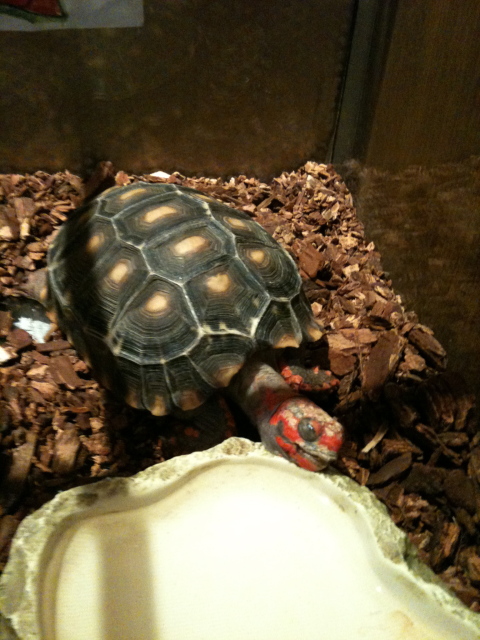 cherry headed red footed tortoise
Question
accolnite
out tortoise is about 9 years hold r
cherry headed red footed tortoise
Question
accolnite
out tortoise is about 9 years hold r
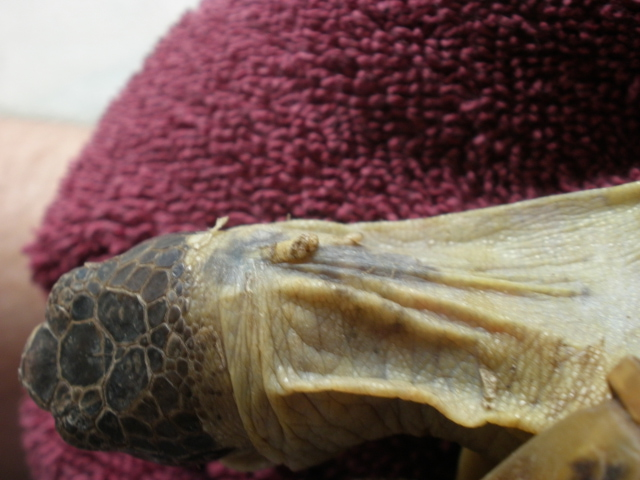 Russian Tortoise neck discoloration
Question
Neck 1 Neck 2
I have a Russian to
Russian Tortoise neck discoloration
Question
Neck 1 Neck 2
I have a Russian to
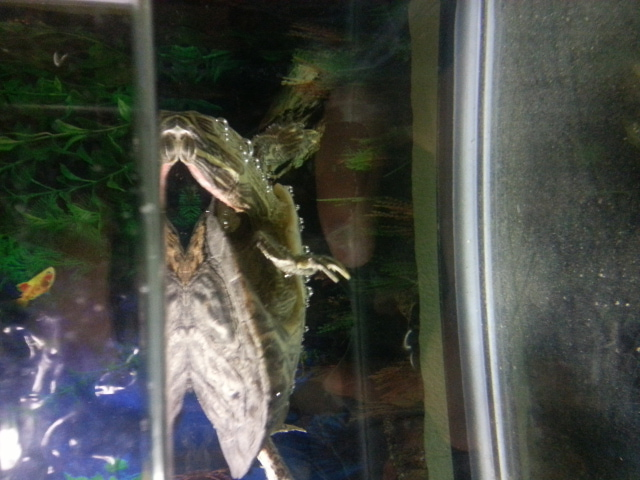 turtle sleeping
Question
turtle in water turtle in water
N
turtle sleeping
Question
turtle in water turtle in water
N